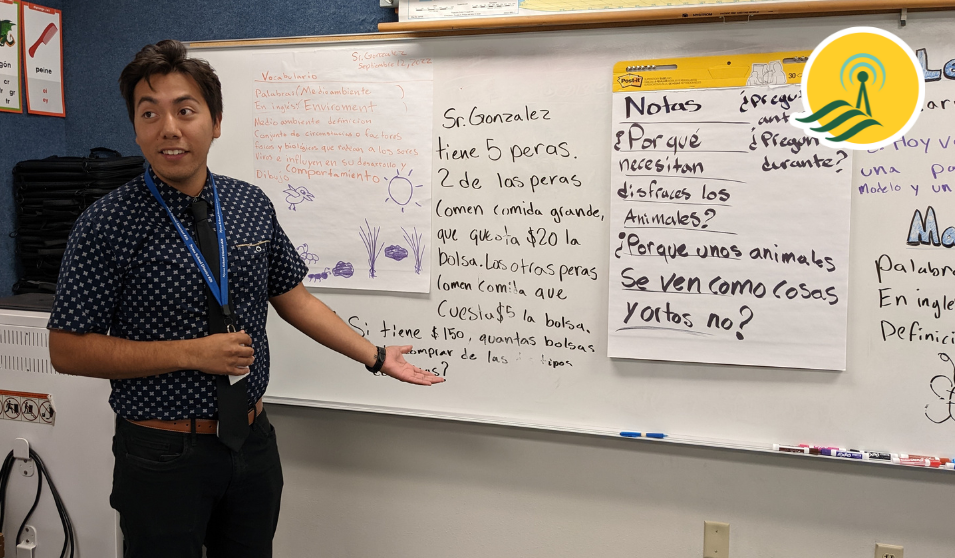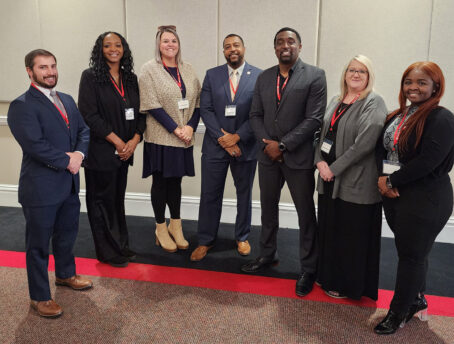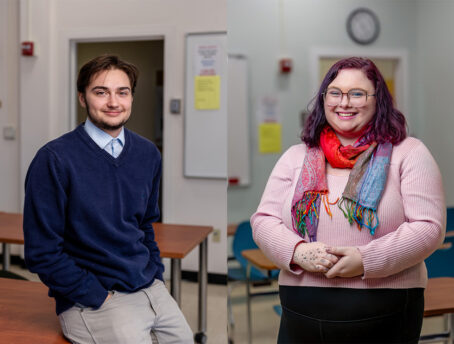Listen to the podcast here:
You can also find our podcast on Apple Podcasts, Stitcher, Google Podcasts and Spotify.
Written version:
Hello, and welcome to the I Am A Rural Teacher Podcast, a project of Rural Schools Collaborative. Education is an invaluable force for the health and strength of rural communities. Osbaldo (Ozzie) Gonzalez, a first-year, Dual Language elementary teacher in Nyssa, Oregon, knows this first-hand. Ozzie is passionate about building a sense of hope, empowerment, and determination in his students, a lifelong mindset that he worked hard to cultivate within himself.
Nyssa is a rural town of about 3,000 on the easternmost border of Oregon. After driving through segments of the Oregon Trail, we followed several trucks, full of onions, from a recent harvest, to reach Ozzie's Elementary School.
Growing up just down the road from where he now teaches, Ozzie wanted to contribute back to the towns of Eastern Oregon’s Treasure Valley:
I actually grew up in Ontario and went to school in Ontario my entire life. I love Ontario, but I decided to come here because it felt new, completely new to me. The community of teachers that I have here is incredible. It's amazing. I do love my other schools. It just felt like it was a new place for me to work. And I kind of liked that aspect about it.
Everybody’s path into education is unique, and while he loves his job now, Ozzie hadn’t always planned on becoming a teacher. Through some encouragement from his peers, he acted on the power they saw within him to be a teacher leader. His friend Christina was especially instrumental in helping him build confidence around taking this leap into a new field:
Originally I wanted to be a chemical engineer. I wanted to basically save the environment. That was my whole purpose of what I was thinking. But I had some great help on the way there. So I want to be like the teachers that got me to that point. I've been working in education longer than I thought. I was working every single summer as an IA for the summer programs, like the dual language program, the ELD program. And I didn't even really realize that I loved it.
My friend, she helped me realize that it was something very apparent in my life and she's like, ‘Just find something you love to do.’ And I did always love to teach. I was always a tutor, a math tutor, in college and it felt so cool helping all the students out. And I even went a step further and I helped with a GED program for Spanish speakers so they could get educated and they could get their GED so they don't have to just live their life without a high school education, at least.
That opened my eyes to a lot of stuff and it felt important and I felt my importance. I got super into it, and I started, and I finished, and I graduated from EOU. It was a weird loop but I got to somewhere I’m really happy.
Now determined to pursue the education profession, Ozzie transferred to Eastern Oregon University’s College of Education, where he was able to make use of their hybrid teacher pathway program. EOU’s virtual option allowed Ozzie to remain in the community he loved, surrounded by his support network, and continue working locally. The program also helped him build a supportive community of fellow teachers in the region:
I have a couple friends that we helped each other out throughout the year. It was amazing. And just our, not even just a couple friends, I made the whole cohort my friend, and we all had just a huge group chat. We just talked…like during class we could say, ‘Oh my gosh, I can't believe she can't open the thing,’ or something just funny. It's cool having a good cohort. They should do that…like for every college.
This is Ozzie’s very first year teaching, and already he appreciates the value of a dual language environment. He shares that since nearly 80% of the region is Spanish speaking, the dual language setting connects the classroom with the community and yet challenges students to grow:
It's dual language, so we're teaching everything in Spanish, and I have a co-teacher that teaches everything in English. So I get my class in the morning, my homeroom, they switch to the English side in the afternoon and his class comes to my side on the afternoon. So they're learning both subjects, both cores…or the same core, but in two different languages.'
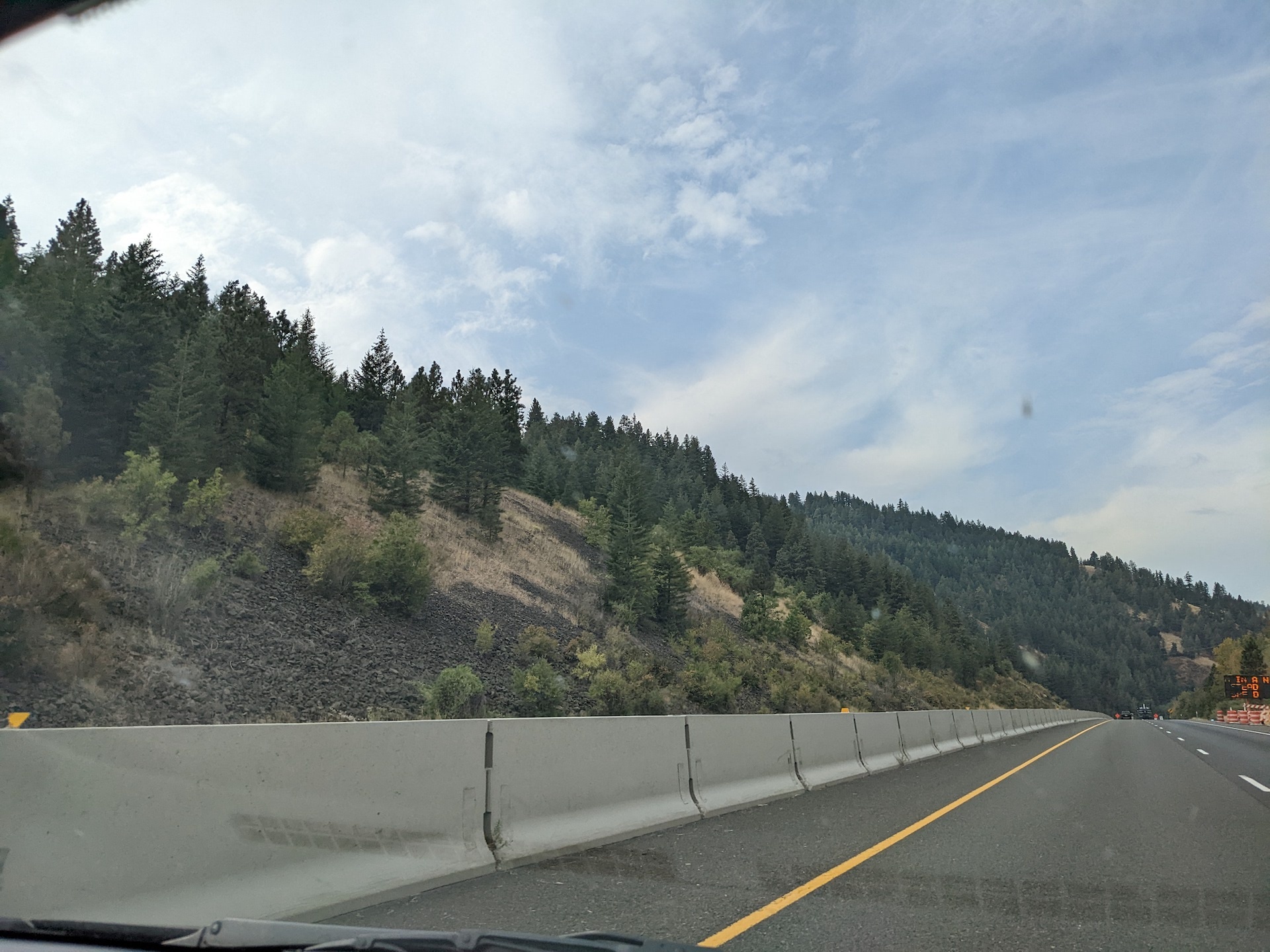
The dual language format has been a learning experience for Ozzie too. Spanish is his first language, but he did not use academic Spanish growing up. And even though he occasionally has to look up the translation for words like "Supernova", he’s excited to learn alongside his students:
Spanish is my first language, but unlike my students, I didn't have the academics in Spanish. so it's, it's really weird. I grew up speaking Spanish my entire life, but I never studied in it or never used it to learn English better or learn my other subjects better, even though that's my first language. So now I could do that for them. So it feels awesome doing that too.
To help both his students, and himself, practice Spanish, Ozzie often sits with students during recess to just talk about anything they want:
At recess there's a group of students, like eight or 10 of them, that just come and sit down and they ask questions about, ‘How our trees are made? Where does dirt come from? Where does sand come from?’ And I love talking about that stuff. So I just explain everything. And today I was like, right, ‘The universe started from a marble-size piece of matter that exploded.’ I just teach them whatever they're interested in, and I could do it in English, but it's a lot harder in Spanish than you think.
Much of Ozzie’s passion in the classroom comes from encouraging students to take bold, first steps forward in learning, and to reassure them along their academic and life journeys despite the challenges or shortcomings they may face:
I felt like I could decrease that gap of knowledge just by understanding the students because I lived a life. I came from the same kind of community and… I don't know, I just really want to help other students not get to where I was and then kind of just turn around. So I wanna be like, ‘Okay, if I didn't do it at least maybe I could have a bunch of other students that probably could.’
From a third grade setting, you could already get them to have that drive to wanna learn. And I think that's an important thing. They had told me, ‘What was your goal for this year?’ on our interview for this position. And I was like, ‘I want my students to be courageously ambitious.’ I want them to dream big and try, just try, just do it. And I guess my whole point for that is: I want them to not give up on themselves and I want them to just push and just go for it. Even if it's hard, there's this thing where we say in my classroom, ‘[Saying in Spanish]: are you gonna give up if it's hard?’ And I want them to say no. Because it's hard, it's what's making you grow. And you could touch all these minds to want to do stuff because it's hard.
And even though both he and his students grew up speaking Spanish, the language component presents an additional struggle that Ozzie helps his students overcome:
Especially in Spanish, it's frustrating for students. It's frustrating for me, it's even more frustrating for them because they're trying to learn new concepts and they're trying to learn new language at the same time. So, just learning math is one thing, but learning Spanish and math at the same time is very frustrating and very difficult. And it would break anyone.
You have to know that you're going to struggle. You're it's going to be hard. You're gonna just need to push through and just try your best. And if you keep pushing, you eventually grow and you grow tougher and you grow better and you grow smarter. You learn a lot of lessons through that difficulty.
Above all, through the difficulties of learning together, Ozzie wants to be that classroom role model for students that he didn't have at that age:
I wanted to be the role model I felt like I needed, I really did. Whew…there wasn't a whole lot of male role models in my school life and it's important. And especially not Hispanic male role models. So I think I could help a lot of these kids, just have someone they could look up to.
And of all the lessons he wishes to share with his students, he shares that the first is to never give up:
Never give up. If it gets hard, that's when you know you're doing something well, something's growing. I really want them to have that. And then believing in yourself, that's a big one. That's a hard one, but really, truly believing that you could do something - that's the fire that gets you to do everything.
Ooh, asking for help. That's one that I learned the hard way... I was always a prideful kind of person in college. I was like, ‘Dude, I could do it. I could just work and I could go to school.’ And you really need help. Especially if you come from a rural city, I think you need as much support as you can. Because when you get to those bigger cities with a lot less support, you'll feel the pressure for sure.
I think people think things are harder than they actually are. Because you just gotta go for it. It's the leap of faith, a big leap of faith. And even if it doesn't work out, it's always a great lesson. You find a lot out about yourself and about what you can do and what you wanna do.
Ozzie emphasizes that these lessons of hope and encouragement extend beyond the classroom curriculum, and apply to your personal life as well. He believes in being yourself, and cherishes being able to share passions and interests with students, especially his love of art:
I love the idea of ‘we're working on something that we both are really interested in.’ Like the art projects I was doing. I loved the graffiti kind of style and teaching them how to do that was hilarious. And they all did actually really, really good and just teaching them little things about adding a shadow, how to color in all the same direction. So it looks cleaner and nicer. Just a lot of little things that they were super interested and they're giving me that energy back. I loved it.
I feel they're not exposed to that much stuff unless you are exposed to it in their own households. An adult can like art or Pokemon. It's okay to be yourself. It's okay to like whatever you like. It's really important to me. So I want them to know that it's okay, and it's celebrated with me.
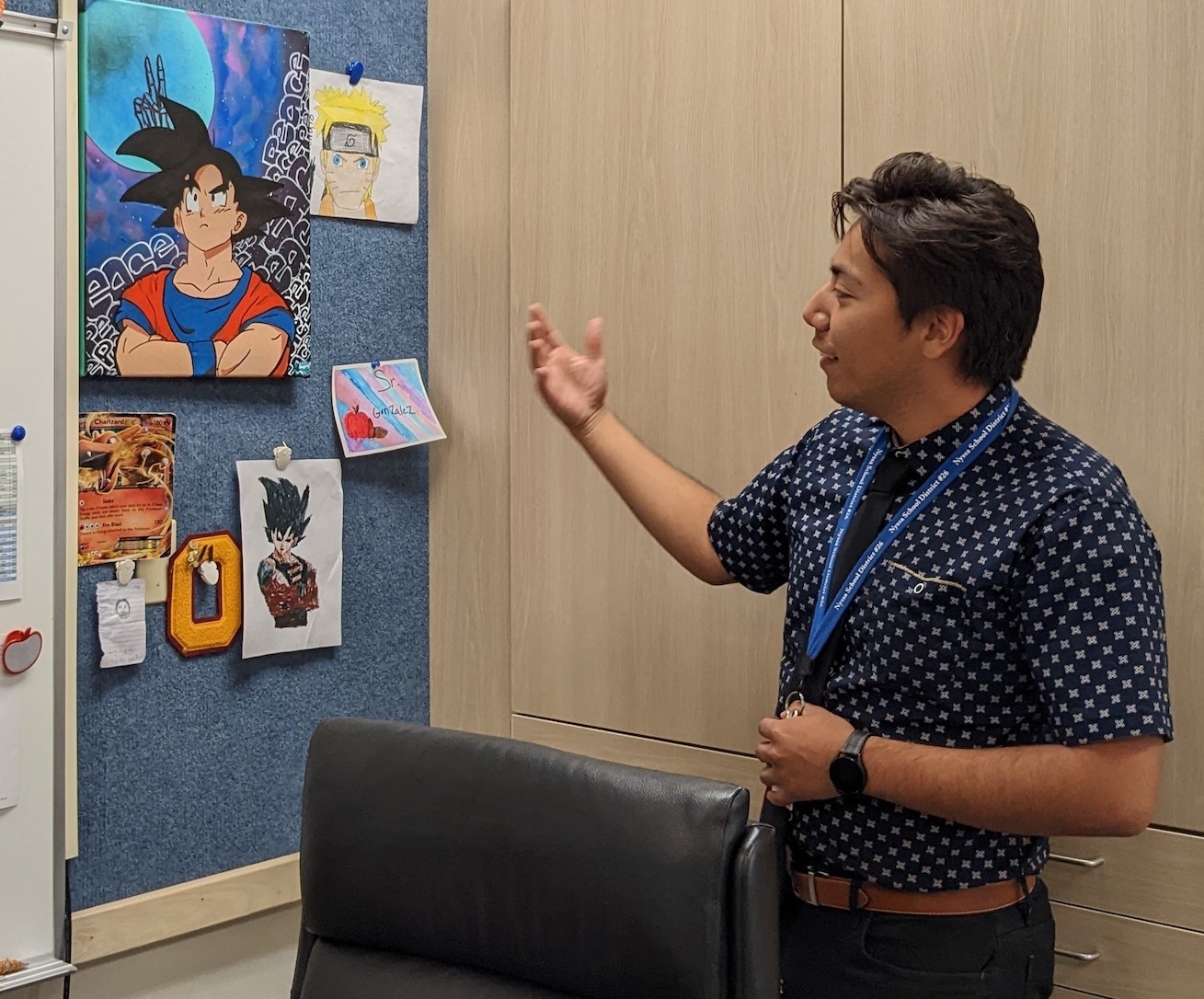
And as much as these are lessons for his students, they are also mindsets he first nurtured for himself. Even just one month into the profession, Ozzie already feels like he’s learned a lot about teaching:
I had this whole thing of creating good habits, creating good mindsets, believing the idea first, or be yourself, and then working on the goals and stuff after you believe in yourself first. That's where I kind of started my teaching persona.
There's so much to teaching that's not teaching: decorating your room, having little art, showing the kids more about yourself. I think you need to do that, so they know that, ‘Oh, he did come from where I'm from.'
Trying to be as organized as you can. There's a lot of people that want to help you, so you should just let them, just accepting help. And be willing to help others because they'll help you in return.
Try to keep your floors clean. <laugh>
Try to predict stuff because you never know how it's gonna turn out. Like a lesson that I'm gonna do…I maybe didn't know how much time I would need to prepare that lesson or how much time I would need to clean up that lesson. You need to think of extra stuff, not just the lesson. Be very flexible. Very, very flexible. A lesson could just not turn out at all, something's just not working out. You gotta abandon it and just go with the stuff you do know really quick.
With hope, determination, and encouragement from those key figures in your life, Ozzie believes that he, his students, and all of us can rise above our situation to seek out our paths forward in life:
There's going to be a lot of stuff that you don't plan for in your life, and a lot of the stuff from around here is sad. And there's a lot of sad stuff that's happened to me personally, and other people around us, but they do pass. it shouldn't keep you from stuff that you want to try to do, it shouldn't keep your life on hold, it shouldn't keep you in a rut forever. You're supposed to not move on, but move with it, forward. I think that's a big one that I had to learn too.
Through it all, Ozzie was grateful for those that encouraged him along the way, and wanting to leave a special note of thanks to those key figures in his life:
I have my best friend, Christina, that kind of got me into all this, opened my eyes and helped me look at things from a different perspective; my family for supporting me; and the teachers that believed in me.
Thank you for engaging with this episode of the I Am A Rural Teacher Podcast. We’d like to thank our partners at Eastern Oregon University for connecting us with Ozzie for this episode, and our partners at the National Rural Education Association for collaborating with us. A special thank you to Ozzie for taking the time to meet with us after the school day, and for being an incredible rural teacher. The I Am a Rural Teacher project is made possible by a grant from The Bill & Melinda Gates Foundation.

